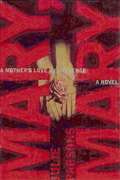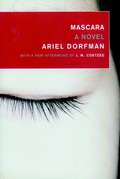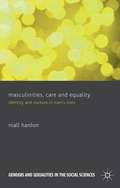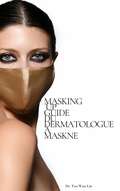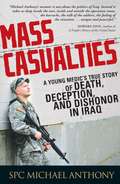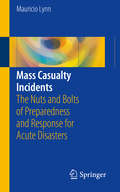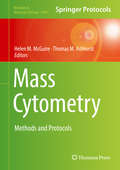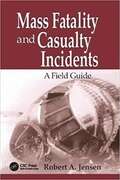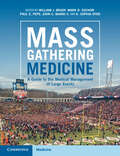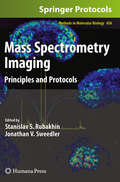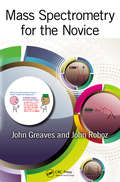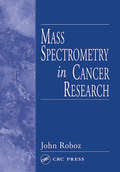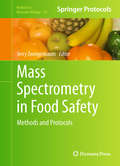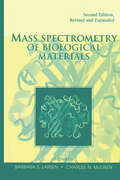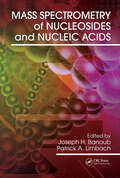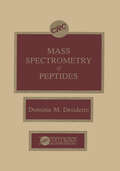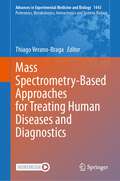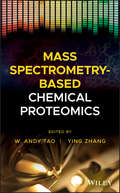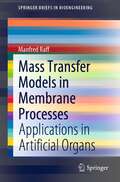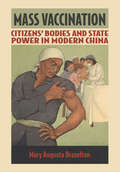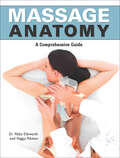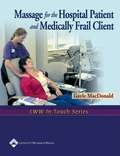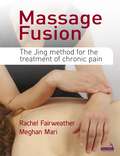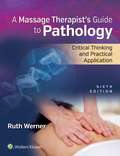- Table View
- List View
Mary on Horseback
by Rosemary WellsTells the stories of three families who were helped by Mary Breckinridge, the first nurse to go into Appalachian Mountains and give medical care to the isolated inhabitants. Also tells about Breckrinridge and Frontier Nursing Service she founded.
Mary, Mary
by Julie Parsonsbrilliant and already acclaimed debut by Julie Parsons is a spine-tingling psychological thriller about an intelligent woman-a psychiatrist -who is intent on taking revenge on the sadistic killer who murdered her teenage daughter. Late on a hot Dublin night. Dr. Margaret Mitchell, a widow in her mid-forties, phones the police with a sense of dread and foreboding. Her daughter, Mary, went out with some friends twenty-four hours ago. She has not come home. Two days later, Margaret receives an anonymous phone call. Having worked in an institution for the criminally insane, Margaret is all too familiar with what she hears on the other end of the line and it fills her with terror. A week later an old man walking his dog beside a canal finds the body of Mary Mitchell half-submerged in the water. She has been raped, tortured, and beaten to death. Inspector Michael McLoughlin, who has a reputation as a drinker and a womanizer, is assigned to the case. Although he was once a successful detective, there are now doubts about his stability. McLoughlin is taken with Margaret's beauty and the force of her personality; he becomes obsessed and watches her constantly. The killer, meanwhile, has transferred his desire to damage and kill to Margaret, who finds herself drawn to the man who ruined her life and destroyed her daughter's. Mary, Mary is a heart-stopping, moving, and emotionally satisfying novel from an extraordinary talent. Julie Parsons weaves a gripping portrait of a killer's mind and a mother's need for justice that will keep you reading straight through to the surprising and shocking conclusion.
Mascara: A Novel
by Ariel DorfmanMascara delves into the dark terrain of identity and disguise when the lives of three people collide. A nameless man with a face no one remembers has the devastating ability to see and capture on film the brutal truths lurking inside each person he encounters. Oriana, a beautiful woman with the memory of an innocent child, is relentlessly pursued by mysterious figures from her past. Doctor Mavirelli is a brilliant and power-hungry plastic surgeon who controls society's most prominent figures by shaping their faces. The twining of these three fates plays out in a climactic unmasking.
Masculinities, Care and Equality
by Niall HanlonMasculinities, Care and Equality explores men's ambiguous relationship with intimate caring work within a context where carefree and nurturing expectations for men are competing for influence. For men, the desire to be more involved carers often clashes with the commonly valued expectations of them as men and this book provides an in-depth, qualitative exploration of a diverse range of male perspectives on the role of love and care in their lives, examining how different men position themselves when confronted by this contradictory expectation.
Masking Up: Guide du dermatologue à Maskne
by Wan Lin TeoMasking Up - A Dermatologist's Guide to Maskne est écrit par le Dr Teo Wan Lin, l'un des éminents dermatologues de Singapour et directeur médical du TWL Specialist Skin & Laser Centre. Masquer l'acné ou « maskne » en abrégé est un nouveau terme inventé pendant la pandémie de COVID-19 de 2020, plus précisément connu sous le nom d'acné mécanique ou d'acné d'occlusion pour les dermatologues. Ce livre est écrit comme un guide du phénomène, avec des soins de la peau, des conseils de maquillage pour la « nouvelle normalité » du port du masque, ainsi que des informations sur la façon de choisir le bon masque en tissu. Le Dr Teo dirige le développement d'une branche de recherche en science des matériaux, Dr.TWL Biomaterials, qui se concentre sur de nouveaux biomatériaux écologiquement durables pour les applications cutanées. En tant que première entreprise textile cosméceutique dirigée par des dermatologues, la branche biomatériaux développe une technologie de pointe pour les textiles biofonctionnels de nouvelle génération. Dermatologue pionnier dans le domaine du développement de textiles biofonctionnels, la lettre de recherche originale du Dr Teo « Considérations de diagnostic et de gestion de Maskne à l'ère du COVID-19 » a été publiée par le Journal of the American Academy of Dermatology, classé le premier* journal de dermatologie à l'international, en octobre 2020. *Classement des facteurs d'impact 2019 publié par le Journal Citation Reports (JCR) Web of Science Group.
Mass Casualties: A Young Medic's True Story of Death, Deception, and Dishonor in Iraq
by Michael AnthonyFrom the Introduction:"Look around," the drill sergeant said. "In a few years, or even a few months, several of you will be dead. Some of you will be severely wounded or so badly mutilated that your own mother can't stand the sight of you. And for the real unlucky ones, you will come home so emotionally disfigured that you wish you had died over there." It was Week 7 of Basic Training . . . 18 years old and I was preparing myself to die. They say the Army makes a man out of you - but for 18-year-old SPC Michael Anthony, that fabled rite of passage proved a very dark journey. After soliciting his parents’ approval to enlist at only 17, Anthony began his journey with an unshakeable faith in the military born of his family's long tradition of service. But when thrust into a medical unit of misfits as lost as he was, SPC Anthony not only witnessed the unspeakable horror of war—but the undeniable misconduct of the military—firsthand. Everything he ever believed in dissolved, forcing Anthony to rethink his loyalties, and ultimately risk his career—and his freedom—to challenge the military he had so firmly believed in. This searing memoir chronicles the iconic experiences that changed one young soldier forever. A seasoned veteran before the age of twenty-one, he faced the truth about the war - and himself - in this shocking and unprecedented eyewitness account.
Mass Casualty Incidents
by Mauricio LynnThis manual is aimed to provide health care professionals, at the scene and at hospitals, as well as allied organizations, a practical and operational approach for planning the response to mass casualty incidents (MCI's), with emphasis to the types of events that are sudden in nature, resulting in a number of injured or contaminated patients that overwhelm the local health care system. From activation of the MCI plan to the specific medical care of multiple simultaneous patients, the manual offers checklists and algorithms of "what to do" during the first minutes after a MCI occurred. The manual is designed to be adapted and modified for specific institutions according to their size and capabilities. Written by a world expert in the field of MCI management, Mass Casualty Incidents: The Nuts and Bolts of Preparedness and Response for Acute Disasters is a valuable resource for all health care professionals and institutions that deal with mass casualty incidents.
Mass Cytometry: Methods and Protocols (Methods in Molecular Biology #1989)
by Helen M. McGuire Thomas M. AshhurstThis book details up-to-date and cutting edge compilation of protocols in mass cytometry. Chapters guide readers through setting up a facility, panel design and reagent preparation, sample preparation, specific applications, and data analysis. Written in the highly successful Methods in Molecular Biology series format, chapters include introductions to their respective topics, lists of the necessary materials and reagents, step-by-step, readily reproducible laboratory protocols, and tips on troubleshooting and avoiding known pitfalls.Authoritative and cutting-edge, Mass Cytometry: Methods and Protocols aims to ensure successful results in the further study of this vital field.
Mass Fatality and Casualty Incidents: A Field Guide
by Robert A. JensenMass Fatality and Casualty Incidents: A Field Guide presents in checklist form the recommended responses to events that result in mass fatalities, such as the Oklahoma City bombing, the crash of a jet airliner, or the attack on the World Trade Center. All cities in the United States will have to have a mass fatality disaster plan in effect by the end of 1999. Mr. Jensen is a leading authority in this area and provides training for police, fire and hospital personnel (including EMTs and social workers), local, state, federal and international emergency planners and responders. This book details actions that are part of a mass fatality incident response. Specifically, they are the actions that begin once life and property preservation ceases and continues through to the release of the deceased. Thus, primary focus is on search, recovery, medicolegal investigation, personal effects operations, family assistance operations, and media operations. Ancillary steps include logistics support, security, responder protection, attitudes and coping with mass death.
Mass Gathering Medicine: A Guide to the Medical Management of Large Events
by William J. Brady Mark R. Sochor Paul E. Pepe John C. Maino II K. Sophia DyerMass medical deployments to large events, such as music festivals or sporting events, are increasing in number, size, and complexity. This textbook provides guidance and direction for rational, effective, and practical medical management of mass gathering events for medical leaders. This is the first authoritative text on mass event medicine, filling a much-needed gap in a large and important area of the specialty. An international group of contributors introduce the specialty and cover topics such as general deployment, staffing, equipment, and resources, moving on to more complex issues such as the business aspect of mass gathering medicine and the legal implications. There are also practical chapters on specific types of events and adverse events such as terrorism, severe weather, and civil disobedience. An invaluable text for all healthcare professionals planning for and attending mass events, particularly EMS professionals, large event planners and administrators, and law enforcement and security personnel.
Mass Spectrometry Imaging
by Jonathan V. Sweedler Stanislav S. RubakhinMass spectrometry (MS) offers unmatched capabilities for the detection, characterization, and identification of a broad range of analytes. Mass spectrometry imaging (MSI) integrates MS data with information on the spatial distributions of the analytes, further enhancing the applicability of MS. In Mass Spectrometry Imaging: Principles and Protocols, expert practitioners from academia, industry, and the clinic contribute cutting-edge protocols describing the application of MSI to investigations of analyte localization in a variety of specimens, from microorganisms to plant and animal tissues. Divided into three sections, this volume presents the principles of MS, current and future trends of MSI, and qualitative and quantitative protocols to measure and identify endogenous metabolites and xenobiotics. An array of MSI approaches and technologies for characterizing peptide and protein distributions are described in detail. Written in the highly successful Methods in Molecular BiologyTM series format, protocol chapters include introductions to their respective topics, lists of the necessary materials and reagents, and step-by-step, readily reproducible laboratory procedures. Also included are notes providing tips to avoid experimental pitfalls and helpful suggestions for method troubleshooting. Comprehensive and up-to-date, Mass Spectrometry Imaging: Principles and Protocols is written for scientists, biological and chemical engineers, and clinicians who are interested in applying MSI in their work and those who would benefit from having detailed experimental guidelines available in a single, convenient source.
Mass Spectrometry for the Novice
by John Greaves John RobozWith usage of mass spectrometry continually expanding, an increasing number of scientists, technicians, students, and physicians are coming into contact with this valuable technique. Mass spectrometry has many uses, both qualitative and quantitative, from analyzing simple gases to environmental contaminants, pharmaceuticals, and complex biopolymers. The extraordinary versatility can make mass spectrometers daunting to novices. Consequently, new users would benefit greatly from an understanding of the basic concepts as well as the processes that occur in these instruments. Mass Spectrometry for the Novice provides exactly that, with detailed, straightforward descriptions and clear illustrations of principles of operations and techniques.The book begins with an overview that includes essential definitions and then provides information on the components of and the strategies used in the most common instruments. The authors discuss the methodologies available, classes of compounds analyzed, and the types of data that can be generated. A group of representative applications from published articles is summarized, demonstrating the diversity of mass spectrometry. The authors also condense the essentials of the topic into one invaluable chapter that provides a set of concise take-home messages on all aspects of mass spectrometry. The final section provides a collection of resources including books, reviews, and useful websites.Using simple language, new color figures, clever cartoons, and assuming no prior knowledge, this book provides a readily understandable entrée to mass spectrometry. Downloadable resources with selected figures and cartoons is included.
Mass Spectrometry in Cancer Research
by John RobozCancer research is becoming multidisciplinary. The complex structural and therapeutic problems require synergistic approaches employing an assortment of biochemical manipulations, chromatographic or electrophoretic separations, sequencing strategies, and � more and more mass spectrometry.Mass Spectrometry in Cancer Research provides a broad
Mass Spectrometry in Food Safety
by Jerry ZweigenbaumAs a key component of human survival, a safe and sufficient food supply is essential for a healthy and productive population throughout the world, so assurance that the food supply is clean and free of harmful substances is a global concern. In Mass Spectrometry in Food Safety: Methods and Protocols, experts in the field provide context to the subject through reviews of regulations in various countries, the current state-of-the art, and specific, detailed scientific methods being employed today. The volume thoroughly covers the key areas in food safety, such as detection of low level chemical residues, pesticide analysis aided by chromatographic techniques, and the revealing of mycotoxins and chemical contaminants from packaging materials. Written in the highly successful Methods in Molecular BiologyTM series format, method chapters contain introductions to their respective topics, lists of the necessary materials and reagents, step-by-step, readily reproducible laboratory protocols, and tips on troubleshooting and avoiding known pitfalls. Pertinent and cutting-edge, Mass Spectrometry in Food Safety: Methods and Protocols serves researchers with both understanding and appreciation for the contribution of mass spectrometry and its vital application to food testing and food safety.
Mass Spectrometry of Biological Materials
by Barbara S. Larsen Charles N. McewenSecond Edition provides up-to-the-minute discussions on the application of mass spectrometry to the biological sciences. Shows how and why experiments are performed and furnishes details to facilitate duplication of results.
Mass Spectrometry of Nucleosides and Nucleic Acids
by Joseph H. Banoub Patrick A. LimbachAssembling the work of an international panel of researchers, Mass Spectrometry of Nucleosides and Nucleic Acids summarizes and reviews the latest developments in the field and provides a window on the next generation of analysis. Beginning with an overview of recent developments, the book highlights the most popular ionization methods and illustra
Mass Spectrometry of Peptides
by Dominic M. DesiderioThe purpose of this book is to collect into one volume the research done on the mass spectrometry of peptides. It balances a range of topics including theory, instrumentation, analytical techniques, and biological applications. The scope of the work contains three major sections: ionization methods, instrumental developments, and analysis of peptides. It describes 252Cf plasma desorption and laser-induced multiphoton ionization methodology. This exciting resource covers many new areas, including continuous flow FAB, quantification of human neuropeptides, and peptide mapping. It also discusses Q-FTMS, cross-links, and metal ions.
Mass Spectrometry-Based Approaches for Treating Human Diseases and Diagnostics (Advances in Experimental Medicine and Biology #1443)
by Thiago Verano-BragaThis book presents the technological advances in the field of mass spectrometry-based approaches for treating human diseases and diagnostics as well as the application of such approaches to study, in depth, human diseases, biomarkers discovery and validation, and to provide mechanistic insights of potential new therapeutics. This is an ideal book for students, technicians, researchers, and medical doctors that work in the field of mass spectrometry and proteomics
Mass Spectrometry-Based Chemical Proteomics
by W. Andy TaoPROVIDES STRATEGIES AND CONCEPTS FOR UNDERSTANDING CHEMICAL PROTEOMICS, AND ANALYZING PROTEIN FUNCTIONS, MODIFICATIONS, AND INTERACTIONS—EMPHASIZING MASS SPECTROMETRY THROUGHOUT Covering mass spectrometry for chemical proteomics, this book helps readers understand analytical strategies behind protein functions, their modifications and interactions, and applications in drug discovery. It provides a basic overview and presents concepts in chemical proteomics through three angles: Strategies, Technical Advances, and Applications. Chapters cover those many technical advances and applications in drug discovery, from target identification to validation and potential treatments. The first section of Mass Spectrometry-Based Chemical Proteomics starts by reviewing basic methods and recent advances in mass spectrometry for proteomics, including shotgun proteomics, quantitative proteomics, and data analyses. The next section covers a variety of techniques and strategies coupling chemical probes to MS-based proteomics to provide functional insights into the proteome. In the last section, it focuses on using chemical strategies to study protein post-translational modifications and high-order structures. Summarizes chemical proteomics, up-to-date concepts, analysis, and target validation Covers fundamentals and strategies, including the profiling of enzyme activities and protein-drug interactions Explains technical advances in the field and describes on shotgun proteomics, quantitative proteomics, and corresponding methods of software and database usage for proteomics Includes a wide variety of applications in drug discovery, from kinase inhibitors and intracellular drug targets to the chemoproteomics analysis of natural products Addresses an important tool in small molecule drug discovery, appealing to both academia and the pharmaceutical industry Mass Spectrometry-Based Chemical Proteomics is an excellent source of information for readers in both academia and industry in a variety of fields, including pharmaceutical sciences, drug discovery, molecular biology, bioinformatics, and analytical sciences.
Mass Transfer Models in Membrane Processes: Applications in Artificial Organs (SpringerBriefs in Bioengineering)
by Manfred RaffThis book serves as an introduction on mass transfer models in membrane processes, with a special focus on their applications in Artificial Organs. Various such models are discussed while multiple easy to use module equations are presented, enabling readers to gain basic knowledge of the mass flow of toxins across membranes. This is particularly interesting to membrane manufacturers who may use these equations to improve the relation of module performances and production costs. Additionally, examples which specialize on artificial organs, but in principle can be applied to analogous environmental, food and biotechnology processes- are analysed. This book will appeal to readers who want to understand how membrane modules and processes can be optimized and will be a great tool for graduates, researchers and professionals working in this field.
Mass Vaccination: Citizens' Bodies and State Power in Modern China (Studies of the Weatherhead East Asian Institute, Columbia University)
by Mary Augusta BrazeltonWhile the eradication of smallpox has long been documented, not many know the Chinese roots of this historic achievement. In this revelatory study, Mary Augusta Brazelton examines the PRC's public health campaigns of the 1950s to explain just how China managed to inoculate almost six hundred million people against this and other deadly diseases.Mass Vaccination tells the story of the people, materials, and systems that built these campaigns, exposing how, by improving the nation's health, the Chinese Communist Party quickly asserted itself in the daily lives of all citizens. This crusade had deep roots in the Republic of China during the Second Sino-Japanese War, when researchers in China's southwest struggled to immunize as many people as possible, both in urban and rural areas. But its legacy was profound, providing a means for the state to develop new forms of control and of engagement. Brazelton considers the implications of vaccination policies for national governance, from rural health care to Cold War-era programs of medical diplomacy. By embedding Chinese medical history within international currents, she highlights how and why China became an exemplar of primary health care at a crucial moment in global health policy.
Massage Anatomy: A Comprehensive Guide (Anatomies of)
by Abigail Ellsworth Peggy AltmanMassages energize, revitalize, and renew both body and spirit, and have even been proven to restore and promote good health. But to safely practice massage, you need to understand how the body works.<P><P> Everyone from new students to experienced massage therapists can benefit from this unique book dedicated to the practice of massage. The world of massage at your fingertips! This comprehensive book explores seven of the world's best-known styles of massage: Swedish, Fusion, Shiatsu, Thai, River Stone, Reflexology, and Reiki. Massage Anatomy uniquely combines an understanding of the human body with different massage styles, making it an excellent resource for practitioners of all levels. Detailed anatomical illustrations and approachable text demonstrate body planes, muscle groups, and crucial areas like the nervous and lymphatic systems. There is also a helpful reference section on massage terminology and a glossary of muscles. Discover the ancient secrets practiced by Native Americans and Egyptians using warm stones that are applied to the body. Feel the "spirit life force" of reiki, a centuries-old Japanese technique used to promote peace and well-being. And find out how to combine Swedish, deep-tissue, and sports massage techniques for a fabulous massage fusion.
Massage For The Hospital Patient And Medically Frail Client
by Gayle MacdonaldThis is an essential, one-of-a-kind resource for gaining the skills and knowledge you need to provide safe, effective massage therapy to patients in acute care settings and private practice clients who are medically frail. As demand grows for massage therapy in acute care, many bodyworkers seek to broaden their ability to meet this important need. To paraphrase the author: For many touch therapists, massage is more than a job or a profession--it's a calling. With the knowledge gained from this expertly written book, you will be able to confidently provide massage therapy in the hospital, other care settings, and for clients affected by health problems. It's the ideal guide for student bodyworkers and practitioners, educators, hospital administrators, and a wide range of medical professionals.
Massage Fusion
by Rachel Fairweather Meghan MariMassage Fusion is an essential companion for any manual therapist interested in treating common pain issues. Acclaimed teachers and therapists, Rachel Fairweather and Meghan Mari offer a practical and dynamic step-by-step approach to gaining results with persistent client problems such as low back pain, neck pain, headaches, carpal tunnel syndrome, TMJ disorders, stress-related conditions and stubborn sporting injuries.The book outlines a clear and evidence-based rationale to treatment using a clinically tried and tested combination of advanced massage techniques including myofascial work, trigger point therapy, acupressure, stretching and client self-care suggestions. Named after the authors' successful UK based training company, the 'Jing method' has helped thousands of therapists build their practices. Beautifully illustrated with clear photographs of each step, this book gives massage therapists a tried and tested blueprint for approaching chronic pain conditions with confidence.Drawing on both the available evidence and several decades of clinical experience, Massage Fusion brings together art and science, East and West, philosophy and psychology into a joyful exploration of how to gain the best results for your clients. A must read for all bodyworkers who want to be the best!
Massage Therapist's Guide to Pathology: Critical Thinking and Practical Application
by Ruth WernerHelp your students build strong clinical reasoning and clinical thinking skills with the new edition of Ruth Werner,,s bestselling pathology text for massage therapist students, also available as an enhanced interactive eBook. A Massage Therapist,,s Guide to Pathology, 6e continues to set the standard for the course through up-to-date, high-value content, an outstanding illustration program, and the author,,s trademark accessible writing style. With skill and passion, Werner makes pathology fascinating and understandable for massage therapy students as it prepares them to work independently or within a health care team to make choices that result in the best possible outcomes for clients living with a wide range of diseases and disorders. Updated throughout to reflect the latest research, the Sixth Edition now offers a stronger focus on evidence-informed practice. And, to keep pace with evolving standards, the Sixth Edition is now ELAP-compliant, has testing formats compatible with the MBLEx exam, and features updated content consistent with the DSM-V. For prior users, a detailed chapter-by-chapter conversion guide is available to ease transition from the Fifth to the Sixth Edition. Student Resources for each chapter: - Engaging crossword puzzles, hangman-style games, and game show questions help build familiarity with important ideas. - Flashcards reinforce concepts of the "In Brief" feature and a second set of flashcards reviews Greek/Latin roots and their English equivalents. - Practice quizzes help students assess their understanding and prepare for exams. - An Audio Glossary assists in pronunciation and key term mastery. - Interactive Labeling Exercises give students hands-on practice in labeling figures from the book. - Modality Recommendation Charts provide guidance on massage in different modalities for each condition. Instructor Resources, organized by condition and chapter: - Curriculum guidelines, "Secrets of Teaching Pathology" from the author, offer suggestions on customizing a pathology course to individual needs including how to choose content, how to use quizzes and examinations, examples of student projects, and more. - Expanded chapter objectives are ELAP-ready for faculty convenience. - Lecture notes in outline form can be used for teaching notes, student handouts, or both. - An image bank with all of the art from the text is available in an easily downloadable format. - PowerPoint slides with embedded images streamline lecture preparation. - The Test Bank, written in 2 levels ("receive and respond"/ "application of concepts") better reflects the MBLEx exam and is ideal for quizzes, tests, and homework assignments. All resources are keyed to chapter objectives for maximum usability.

